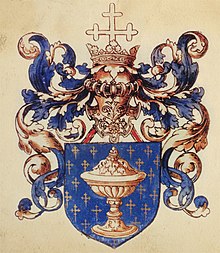Xunta of the Kingdom of Galicia
It declared itself the supreme authority of the Kingdom from June 18, 1808, during the Peninsular War and due to the abdication of the King, and until Galicia was conquered by the Napoleonic troops in 1809.
[4] Initially the Xuntas Generales del Reino de Galicia was an assembly where representatives of the three states of the Kingdom (noblemen, churchmen, and the commoners) met.
[7] The Xunta, whilst having little direct intervention in law making,[8] and not much control over the Royal administration,[9] could nevertheless raise armies, ships and taxes, conceding or denying the King's petitions on behalf of all the local powers of the Kingdom; the assembly could also petition the King himself, this being the usual mean it used for modifying or approving laws, or for promoting the interests of the Kingdom.
The Xunta was also recognized as the voice and representative of the Kingdom, and the depositary of its will,[10] traditions and rights (foros).
Notwithstanding, the King never consented on the petition of the assembly to meet at will, and from 1637 he decreed that the meetings of the assembly can only take place when in presence of one representative of the monarch, with voice, usually the Governor-Captain General of the Kingdom, so trying to maintain a tighter grip on the institution and its agreements.
